Digital technologies in schools – useful, safe and in moderation
Belgrade, September 2023 – “I think it’s great to have a school platform for online classes. During online classes, we can learn something that we don’t learn at school, and some new things,” says eleven-year-old Masa, a confident sixth-grade student at the Branislav Nusic Primary School in Belgrade.
Masa explains that she uses online classrooms for her favourite subjects, history and physics.
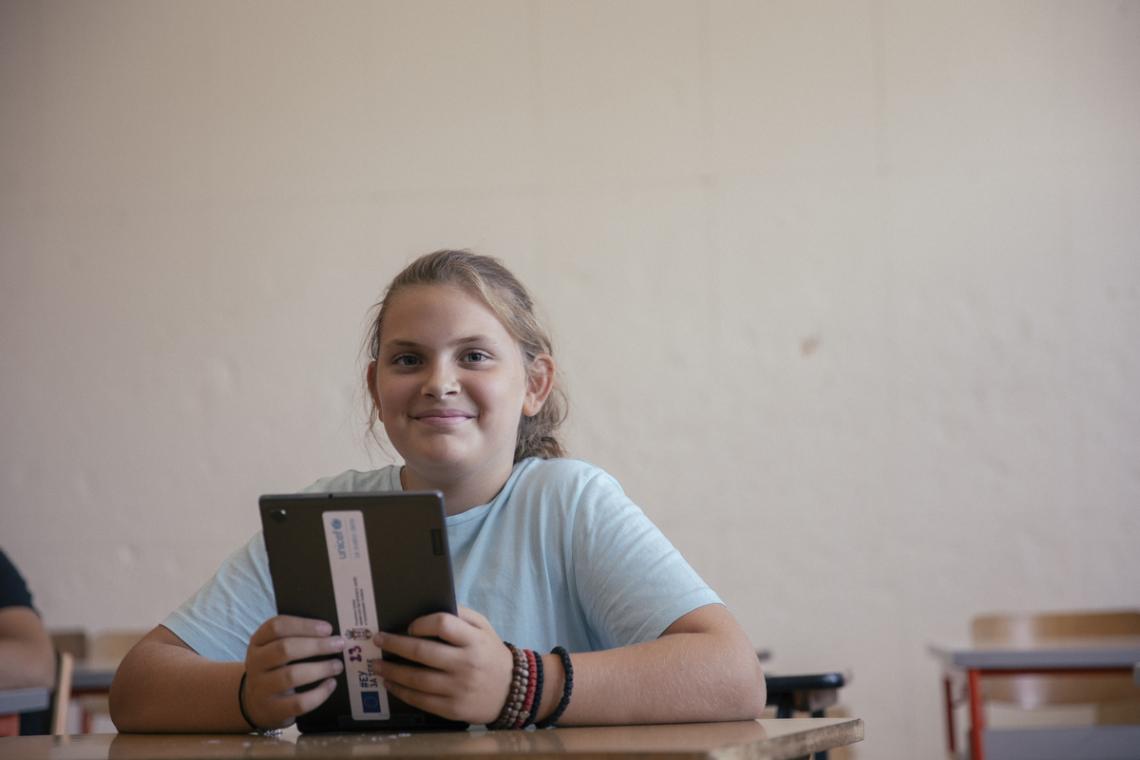
I have multiplication, division, like in math, and then I don’t understand it. I the go home and open this Moodle and read everything the teacher said and I learn it. It also helps me with my homework sometimes, and to improve my grade and get an A.
Masa and her friends being able to learn and build their knowledge in online classrooms within the Moodle platform - the learning management system, is the result of the Bridging Digital Divide in Serbia for the Most Vulnerable Children project. For three years now, UNICEF has been implementing it in 30 schools in cooperation with the Ministry of Education and with the financial support of the Delegation of the European Union. The project was created as a response to the COVID-19 pandemic and aims to increase the resilience of the education system in emergencies so that every child can get adequate learning support. That is why schools got tablets, while Yettel provided internet cards. Moreover, Homework Clubs and Digital Technology Libraries were established, and teachers, psychologists, pedagogists and teaching assistants are building their digital competencies in trainings.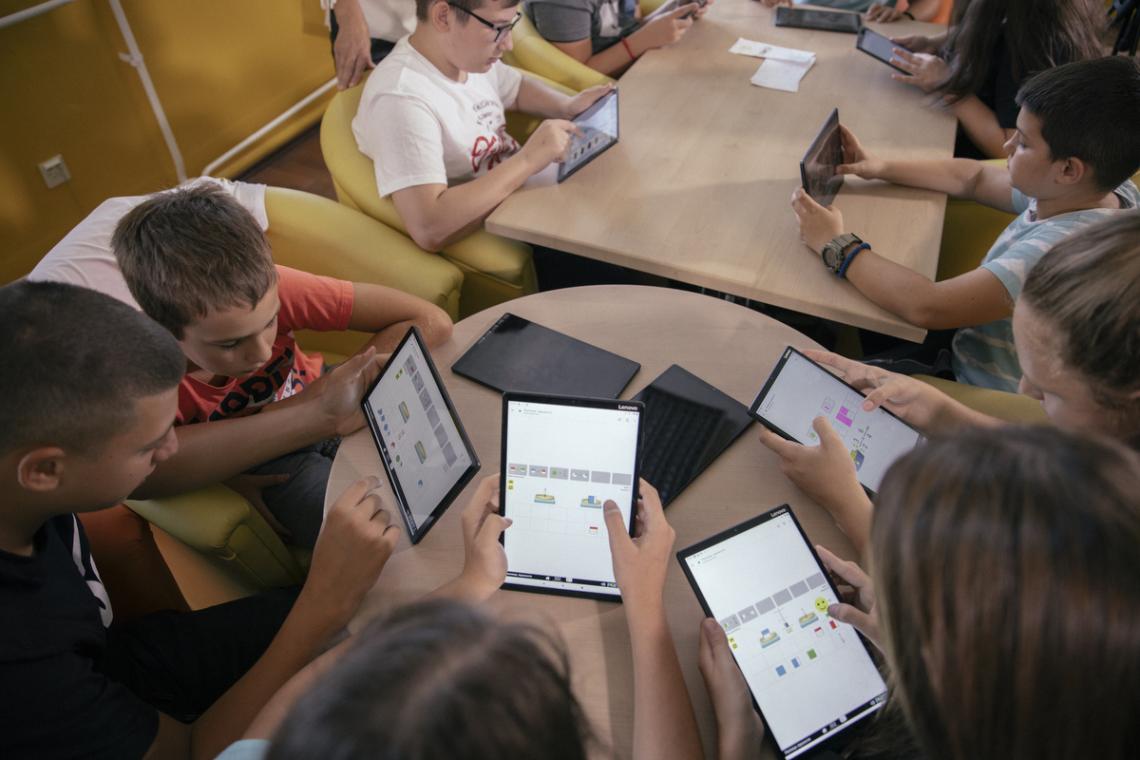
“I like how Moodle works. When I don’t go to school, I can immediately see everything they did. For example, I can find what we did in maths, I can see the lesson explained. I can find tests which help me a lot because if I'm not happy with how I did it, I can repeat it again and again until I learn that lesson,” says Nikola.
This smart and talkative boy, full of confidence, explains how Moodle helps him study faster so he can have more time for his hobbies, acting and playing table tennis. He is also active in forums on the platform where he talks to his teacher and friends.
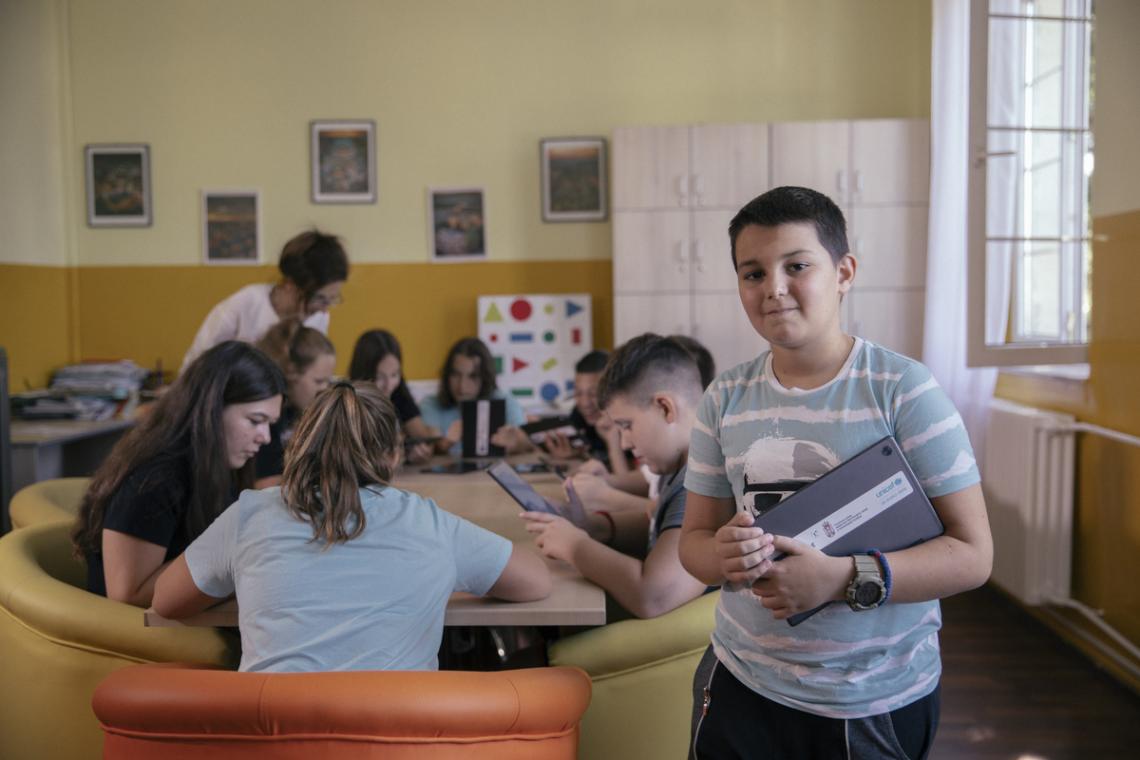
There are tests, quizzes, exercises, and there is revision work from the previous grade, which is something we really need now at the start of the year. I think it can help me improve my average grade, help me better learn my lessons.
Digital technologies are useful and must be used with consideration and in moderation, believes Verica Arula, a teacher of Serbian language and literature with decades of teaching experience.“They should be an infinite pool of possibilities, a treasury of wealth from which you can pick what you need to enrich, facilitate, simplify teaching, take it out of the classroom sometimes, extend it, and expand it socially. The Moodle platform is a treasure. It is the only learning platform that was created for educational purposes with solid pedagogy, methodology and tools that make it possible. Secondly, it is the only platform that ensures complete safety for students,”, says Verica.
Verica supports the efforts to adapt teaching to the changing times and explains how digital technologies help her in teaching and working with children.
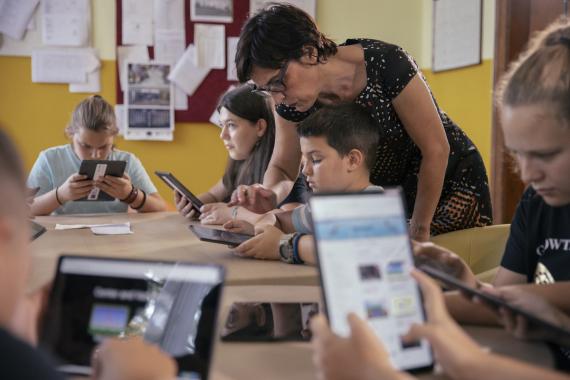
Teaching the Serbian language is a difficult, demanding, comprehensive task. They go home. They use Moodle, listen to new basic information and come to school with that foundation, and we start with building upon it and practicing. What did we do? We have provided students with the opportunity to study when it suits them, in the space where they are most comfortable. And then they come to school, they have the opportunity to work with me in the right way.
The availability of digital technologies is not only important for quality learning but also for equity, says Verica, because education was not always equitable and equally available to all students.“Our school is well equipped with devices, tablets, laptops. Students can sign out a tablet at any time, take it home and work there. They also have the option to use laptops, tablets, graphic boards on the school premises, because there are children who do not have internet access,” ,says Verica.
She believes that digital technologies today are equally important for teachers, parents, and children.
“They can learn when it suits them, the way it suits them, in accordance with their capabilities, they have access to open educational resources that are significantly richer than what is available in regular classes. It makes it easier in the sense that they can go back, repeat things, search for what they need. It somehow makes parents relaxed. They can now just gently guide and supervise learning, and teachers are provided with truly countless possibilities to enrich their teaching and adapt it to each student,” explains Verica.
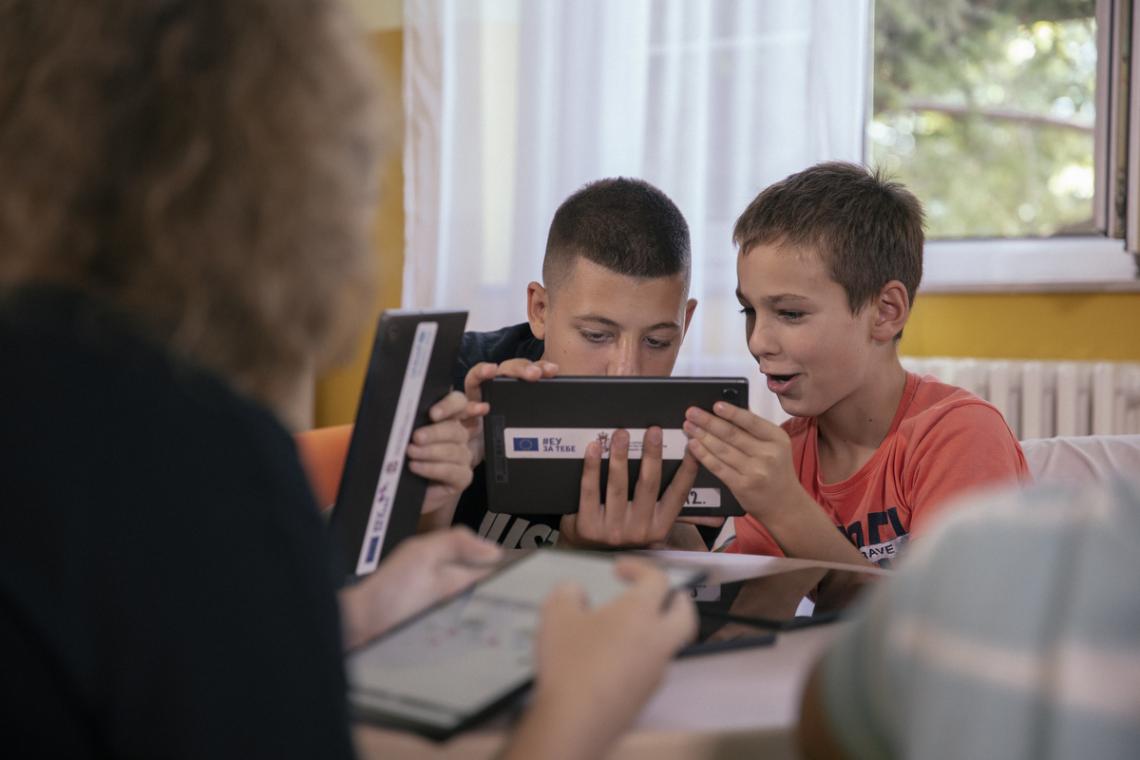
She believes that digital technologies today are equally important for teachers, parents, and children.
“They can learn when it suits them, the way it suits them, in accordance with their capabilities, they have access to open educational resources that are significantly richer than what is available in regular classes. It makes it easier in the sense that they can go back, repeat things, search for what they need. It somehow makes parents relaxed. They can now just gently guide and supervise learning, and teachers are provided with truly countless possibilities to enrich their teaching and adapt it to each student,” explains Verica.
The 18 years of work as a computer science teacher make Katarina Aleksic’s current job as head of the Centre for Educational Technology at the Institute for the Evaluation of Quality of Education easier.
“Digitalization of education in Serbia has two pillars. One consists of strengthening the digital competencies of students and teachers, while the other pillar deals with using digital tools, software, programs and devices in a responsible and meaningful way. This combination of devices and everything that is on the learning platform, on the teacher’s blog, in the repository, that is what we focus on when it comes to digital education”, says Katarina.
She believes that the Bridging the Digital Divide in Serbia for the Most Vulnerable Children project made a huge impact on the development of digital education, but also provided data on which to further build what is foreseen in the Strategy for the Development of Education in Serbia by 2030.
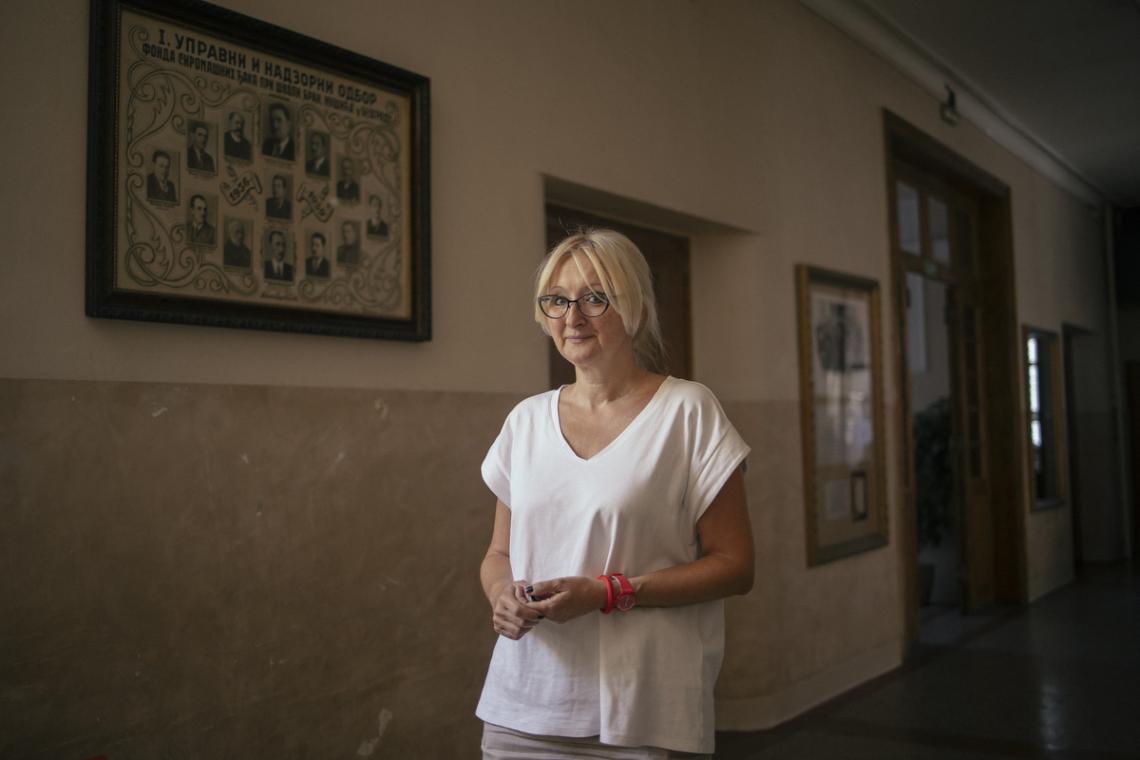
“We have established a national learning management system called Moodle, which is free and open source, but under our ownership - it is installed on servers of the IT Office in Belgrade. It is very important to us for teachers to know that if we do something in the digital world, that it will not disappear, that out work is not ephemeral,” says Katarina.
She also explains that upon the completion of the project, all schools in Serbia will have the opportunity to receive a starter pack for the development of digital education and improvement of the quality of teaching.“They will be able to access open educational resources, including classes broadcast on RTS and Moodle courses that we prepared within this project. So, they will be able to download certain videos for free, exemplary classrooms for the subjects of mathematics, Serbian language, chemistry, physics, etc., which they will be able to immediately install on their Moodle online platforms,” says Katarina.
Verica, who is in a hurry to prepare new exercises in the online classroom for the next day, believes that “it is very important to keep up with the times in which the children live and to keep up with them. The digital world is already their world.”
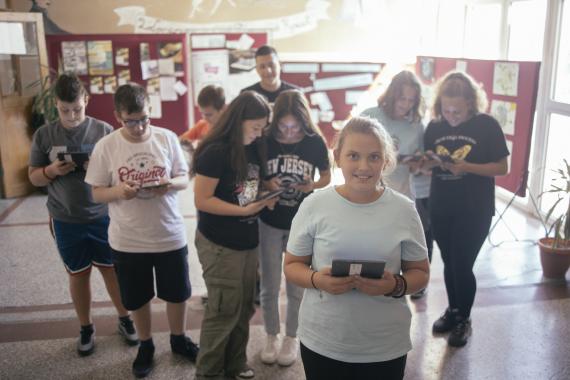
It is clear that these children have many modern, digital opportunities and tools to learn and build their knowledge. Today, Masa and Nikola can read Branislav Nusic’s book in the schoolyard under the walnut tree planted by the writer himself, but also solve quizzes about his works on a tablet. Generations from ten years ago could only dream about that.



